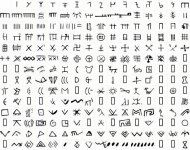Gray & Atkinson (2005) suggested that it was a “natural” choice to select the verbal root *kwel-, ‘turn’ or ‘revolve,’ as the root for *kwékwlos, ‘wheel, thing that turns’ (for example); but there are at least four different verb roots that are reconstructible for PIE with the meaning ‘turn’ or ‘revolve’ (*kwel-, *h2werg-, *wert-, *wel-),1 so the motivation for the specific sharing of a ‘wheel’ word based on *kwel- was not natural but cultural. Moreover, the two words for ‘wheel,’ at least, are analyzable derivatives of verb roots; so to make this explanation work, they would have to have survived with little enough phonological change to make identical derivations feasible, and the old derivational patterns would have to have been used—not once, but in each daughter branch in which the words survive—some three millennia after the languages had split, when wheeled vehicles and axles finally were invented. In addition, those constraints must have affected only the words that would later be used for the wheel vocabulary: Other innovations that occurred after the IE dispersal, things like spoke, iron, tin, chicken, and glass, were named dif- ferently in the dispersed daughter languages. One of the basic postulates of linguistics is that the relation between word and thing is cultural and arbitrary, as the diverse lexemes for the same referent show in this short list of things invented after the IE dispersal. But Gray & Atkinson’s (2005) solution implies that we should accept multiple parallel choices of the same roots and even the same derivatives for utterly new things in a continent-wide coincidence—but only for words that would later be employed for wheels and wagons.The scenario just sketched is already obviously improbable; the formation of the word 0kwékwlos ‘wheel’ makes it more improbable still. Like many PIE nouns, this one was derived from a verb root by adding a suffix and altering the shape of the root. In this noun, the suffix is the thematic vowel *-e-∼*-o- (*-e- in a few forms but *-o- in most), which is immediately followed by the case-and-number endings. Also, the root *kwel- has been reduplicated—that is, its initial consonant has been doubled and the copy is followed by the vowel *e. Finally, the root is in the “zero grade”—that is, its internal vowel has been dropped. Thus, the structure of the citation form given above, *kwé-kwl-o-s, is (reduplication + zero-grade root + thematic vowel + nominative singular ending). That specific formation was very unusual for nouns derived from verbs in the PIE period.
In short, the formation of *kwékwlos is virtually unique in PIE. Fortson (2010, p. 130) suggests that *kwékwlos was “an expressive neologism for a new gadget,” which is a reasonable speculation. The proposal that a noun was formed from a verb in this highly unusual manner numerous times, independently, is practically impossible.


.png)
